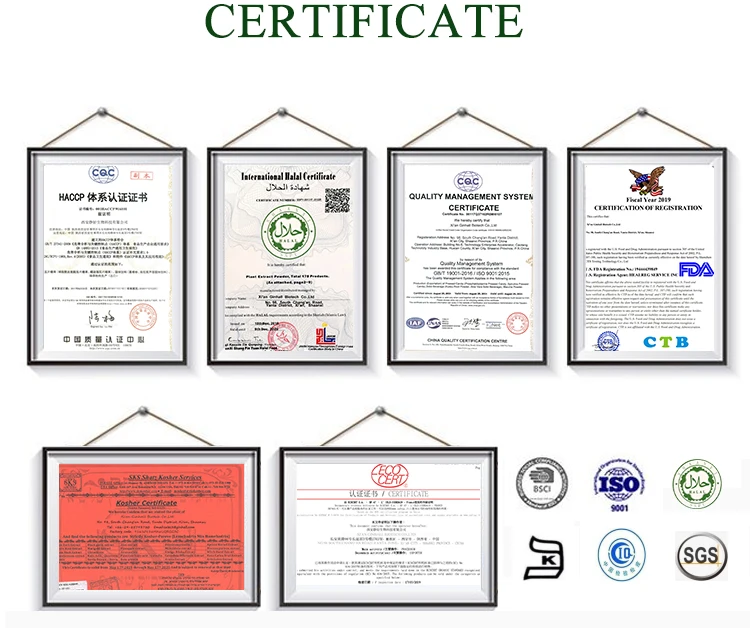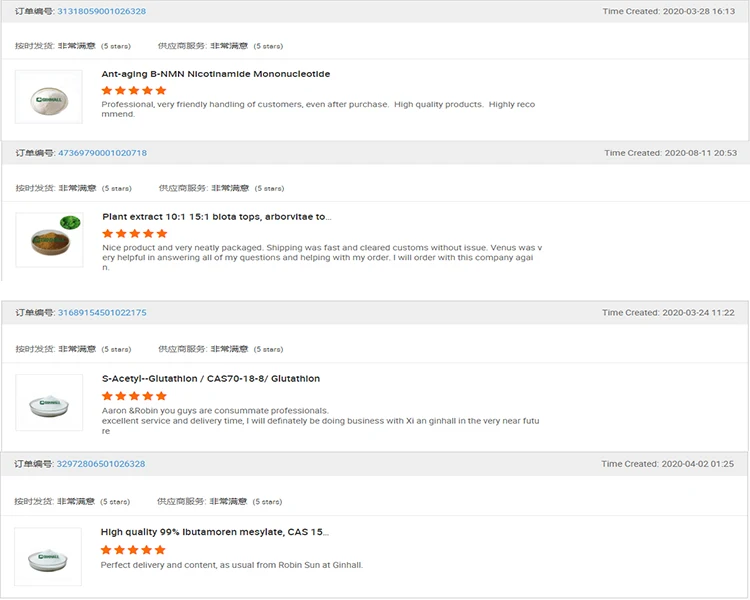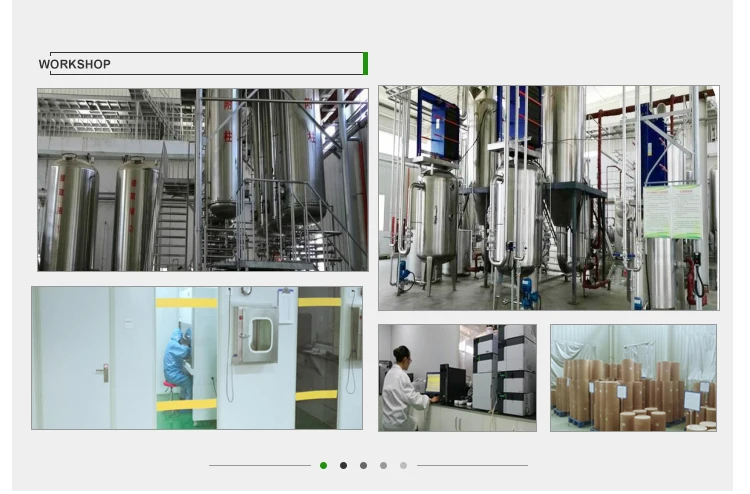Other recommendations for your business
Dietary Supplements 90% Inulin Powder Factory Supply In Bulk

Product Description

What is Inulin?
Inulin is contained in the protoplasm of the cell in the form of a colloid. Unlike starch, it is easily soluble in hot water and precipitates out of water after adding ethanol, and does not react with iodine. Moreover, inulin is very easy to hydrolyze fructose under dilute acid, which is the characteristic of all fructans. Fructose can also be hydrolyzed by inulase. Both humans and animals lack the enzymes that break down inulin. Inulin is another form of energy storage for plants in addition to starch. It is an ideal functional food ingredient and a good raw material for the production of oligofructose, polyfructose, high fructose syrup, crystalline fructose and other products.
Product name | Inulin | Appearance | White Powder |
Botanical Source | Helianthus tuberosus L. | Test Method | HPLC |
Specification | 90% | Mesh | 100% pass 80 mesh |
Application | Health Care | Shelf Life | 2 years |
Function of Inulin

1. Control blood lipids
Intake of inulin can effectively reduce serum total cholesterol (TC) and low-density lipoprotein cholesterol (LDL-C), increase the ratio of high-density lipoprotein/low-density lipoprotein, and improve blood lipid status.
2. Lower blood sugar
Inulin is a carbohydrate that does not cause an increase in glucose in urine. It will not be hydrolyzed into monosaccharides in the upper part of the intestine, so it will not increase blood sugar levels and insulin content. Research now shows that the reduction of fasting blood glucose is the result of short-chain fatty acids produced by the fermentation of oligofructose in the colon.
3. Promote the absorption of minerals
Inulin can greatly increase the absorption of Ca2+, Mg2+, Zn2+, Cu2+, Fe2+" and other minerals. According to reports, teenagers consume 8 g/d (long and short-chain inulin fructans) for 8 weeks and 1 year, respectively. It was found that both significantly increased Ca absorption, and the body's bone mineral content and density also increased significantly.
The main mechanisms of inulin to promote the absorption of mineral elements are: 1) The short-chain fat produced by inulin in the colon makes the crypts on the mucous membrane shallow, and the number of crypt cells increases to increase the absorption area and the cecal veins are more developed. 2) The acid produced by fermentation lowers the pH of the colon, which improves the solubility and bioavailability of many minerals. In particular, short-chain fatty acids can stimulate the growth of colonic mucosal cells and increase the absorption capacity of the intestinal mucosa; 3) Inulin can promote Some microorganisms secrete phytase, which can release the metal ions chelated with phytic acid and promote its absorption. 4) Some organic acids produced by fermentation can chelate with metal ions to promote the absorption of metal ions.
4. Regulate intestinal microflora, improve intestinal health and prevent constipation
Inulin is a natural water-soluble dietary fiber, which can hardly be hydrolyzed and digested by gastric acid. It is only used by beneficial microorganisms in the colon to improve the intestinal environment. Studies have shown that the degree of proliferation of bifidobacteria depends on the number of initial bifidobacteria in the human large intestine. When the initial number of bifidobacteria decreases, the proliferation effect is obvious after using inulin. When the initial number of bifidobacteria is large, use chrysanthemum The effect after powder is not obvious. Secondly, the intake of inulin can enhance gastrointestinal motility, improve gastrointestinal function, increase digestion and appetite, and improve body immunity.
5. Inhibit the production of toxic fermentation products, protect the liver and prevent colon cancer
The food reaches the colon after digestion and absorption. Under the action of intestinal saprophytes (E. coli, Bacteroides, etc.), many toxic metabolites (such as ammonia, nitrosamines, phenol and cresol, secondary bile acids, etc.) can be produced ), and the short-chain fatty acids produced by the fermentation of inulin in the colon can lower the pH of the colon, inhibit the growth of saprophytes, reduce the production of toxic products, and reduce the stimulation of the intestinal wall. A series of metabolic activities of inulin can inhibit the production of toxic substances, increase the frequency and weight of bowel movements, increase the acidity of the stool, accelerate the excretion of carcinogens, and produce short-chain fatty acids with anti-cancer effects, which is beneficial to the prevention of colon cancer.
Application of Inulin



1. Process low-fat foods (such as butter, spreads)
Inulin is an excellent fat substitute. When completely mixed with water, it will form a cream-like structure, which makes it easy to replace fat in foods and provides a smooth taste, good balance and full flavor. It can replace fat into fiber, increase the compactness and taste of the product and stably improve the dispersion of emulsification. It can replace 30-60% of fat in the processing of cream and spread food.
2. Configure a high-fiber diet
Inulin has good solubility in water, which enables it to be combined with water-based systems. It is rich in water-soluble dietary fiber. Unlike other fibers that cause precipitation problems, it is very convenient to use inulin as a fiber ingredient and can make The sensory properties have been improved. They can help the human body get a more balanced diet, so they can be used as high-fiber food ingredients.
3. It can be used as a proliferation factor of bifidobacteria and belongs to prebiotic food ingredients
Inulin can be used by beneficial bacteria in the human intestine, especially it can multiply bifidobacteria by 5-10 times, and at the same time, harmful bacteria will be significantly reduced, improving the distribution of human flora and promoting health. Inulin has been listed as an important Bifidobacterium growth factor.
4. Used in milk beverages, yogurt, liquid milk
Adding 2~5% of inulin to milk beverages, yogurt, and liquid milk can make the product have the functions of dietary fiber and oligosaccharides, and can also increase the consistency, giving the product a thicker creamy taste, better balanced structure and Fuller flavor.
5. For bakery products
Inulin is added to bakery products to develop new concepts of bread, such as prebiotic bread, multi-fiber white bread and even multi-fiber gluten-free bread. Inulin can increase the stability of the dough, adjust the absorption of water, increase the volume of the bread, improve the uniformity of the bread crumb and the ability to form pieces.
6. Used in fruit juice drinks, functional water drinks, sports drinks, fruit juices, jellies
Adding 0.8~3% of inulin to fruit juice beverages, functional water beverages, sports drinks, fruit juices, and jellies can make the beverage flavor stronger and better texture.
7. Used in milk powder, dried milk slices, cheese, frozen desserts
Adding 8~10% of inulin to milk powder, dried milk slices, cheese, and frozen desserts can make the product more functional, stronger in flavor and better in texture.
Product Inspection

Certifications

Packing&Delivery

Five Star Praise

About Us


FAQ

Supplier's popular products
Contact Supplier
We have more categories for you. lf you can't find the products you want above,just fill in the form and tell us whatproducts you want to import from China.


















